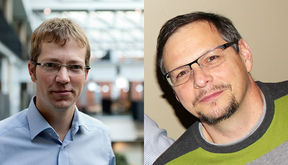ERC Advanced Grants for Peter Liljeroth and Orlando Rojas

Peter Liljeroth and Orlando Rojas work on condensed-matter physics and bioproducts and biosystems, respectively. The ERC Advanced Grants fund exploratory and unconventional approaches by well-established and exceptional scientists. For Rojas, this is the first ERC grant since he moved from the US, while Liljeroth has received the ERC Starting Grant for promising early-career researchers in 2010.
Professor Peter Liljeroth, Aalto University School of Science, will explore and fabricate new, artificial designer materials that do not exist in nature nor have yet been realised in the laboratory. The motivation for studying these materials are their electrical properties, and that they can be manipulated and tuned atom by atom with scanning tunneling microscopy or molecular self-assembly.
‘There are plenty of exciting and exotic predictions in theoretical physics of never-before-seen materials with unique electrical properties. Very few of these have actually been realized in experiments – and this what we intend to achieve. The grant will give us the possibility to take left turns and try out methods and materials that no one has explored yet, let alone managed to fabricate,’ says Liljeroth.
Professor Orlando Rojas, Aalto University School of Chemical Engineering, will build the next generation supra-colloidal systems, capable of performing emergent functions by utilizing trans-disciplinary scientific approaches for deconstruction and re-assembly.
‘Ultimately, my goal is to design and develop the materials of the future based on micro and nanoparticles from cellulose and lignin resourced from plants and lignocellulosic waste.’
For both, Liljeroth and Rojas, controlling and engineering the interactions between atoms and molecules, along with consideration to shape and functional properties would open a whole new avenue for realising materials for the next generation of advanced devices in, for example, quantum computing in Liljeroth’s case or energy harvesting in Rojas’.
Liljeroth will combine superconductors with nanoscale magnets that could produce exotic electrical states that are waiting to be harnessed. Rojas, on the other hand, will design novel routes to control supracolloidal assemblies in new 1D-, 2D- and 3D-structures that can be used to solve some of the grand challenges in water use, carbon sequestration, food and advanced materials.
‘Ultimately, this is fundamental research and we do not yet know all the properties of these materials and what can be done with them,’ Liljeroth notes. ‘Also, adding artificial intelligence and machine learning methods could allow us to find promising combinations and structures that would be too laborious to explore with experiments or traditional simulations. We are already engaged in collaboration in this field at Aalto University.’
'The systematic methodologies that I propose will address the main challenges for lignocellulose processing and deployment, considering the important effects of interactions with water. I hope this will be a turning point for exploiting the exceptional properties of nano- and microscale lignocellulose structures, the most significant materials of the future bioeconomy,' Rojas says.
The European Research Council funded altogether 269 Advanced Grants, worth 653 million euros in total. Finland had altogether four grantees: two at Aalto University, two at the University of Helsinki.
For the ERC press release and a full list of grantees:
https://erc.europa.eu/news/erc-awards-its-2017-advanced-grants-269-senior-researchers-europe
Further information:
Peter Liljeroth, professor
peter.liljeroth@aalto.fi
tel. +358 50 3636 115
Atomic Scale Physics research group
Orlando Rojas, professor
orlando.rojas@aalto.fi
tel. +358 50 5124 227
Biobased Colloids and Materials research group
Read more news

Apply Now: Unite! Visiting Professorships at TU Graz
TU Graz, Austria, invites experienced postdoctoral researchers to apply for two fully funded visiting professorships. The deadline for expressions of interest is 20 February 2026, and the positions will begin on 1 October 2026.Soil Laboratory Exhibition – Exploring the Dialogue Between Human and the Earth in Utsjoki
Soil Laboratory explores the relationship between humans and the earth as a living landscape through ceramic practices in Utsjoki.
The Finnish Cultural Foundation awarded grants for science and art
A total of 15 individuals or groups from Aalto University received grants






